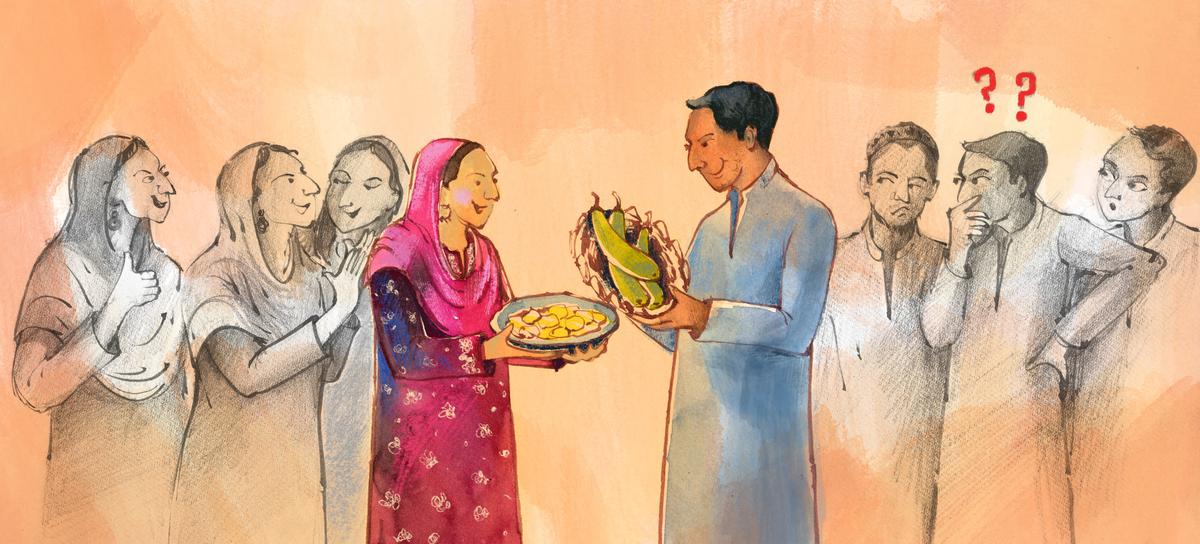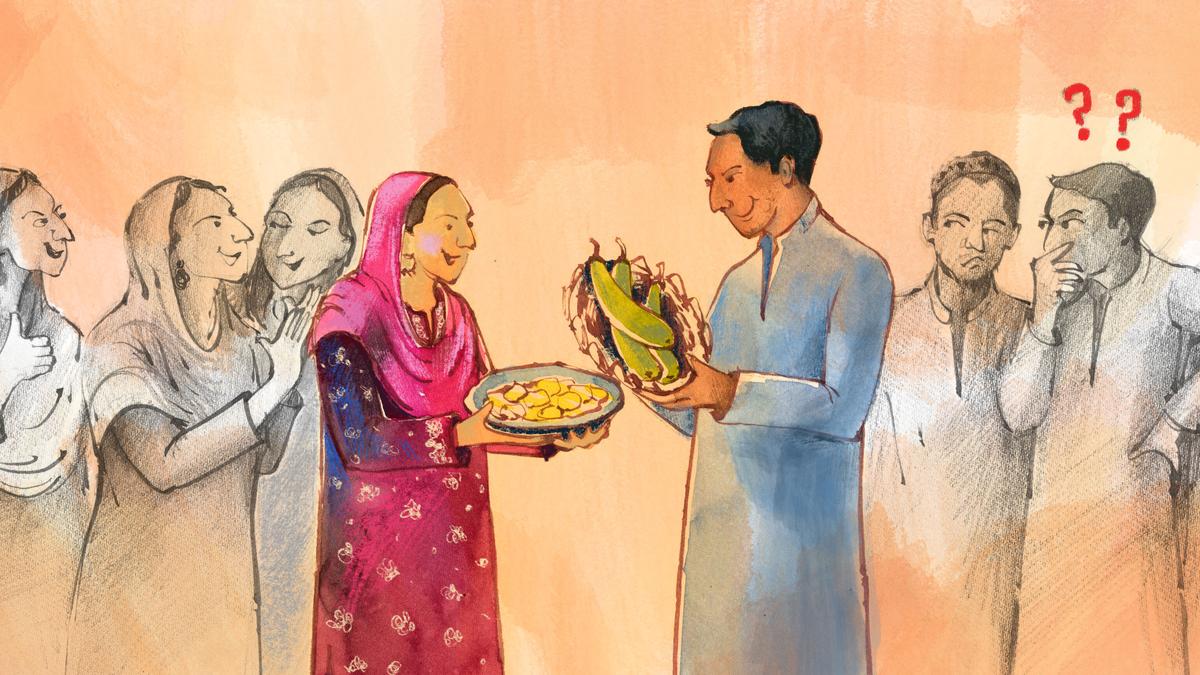Many years ago, on a crisp spring afternoon, I was sitting with Phuphee peeling alle (bottle gourd). Whenever she cooked alle, in any form, she would never fail to mention Gandhiji and how it was his favourite syun (dish).
When Phuphee wasn’t present, other family members would often laugh about it, poking fun at how it was something she had made up. To this day no one has been able to work out if there is any truth in it.
The alle we were peeling had been sourced fresh from Phuphee’s kitchen garden. She was planning to make alle yakhni (chunks of bottle gourd cooked in a velvety mint yogurt sauce). While working, Phuphee asked one of the household help, Aisha, to make some kahwa for the guests. Aisha looked confused as there were no guests present at the house.
‘They will come,’ Phuphee told her.
I looked out of the kitchen window and couldn’t see anyone in the garden, but experience had taught me that if Phuphee said guests were coming, they would definitely arrive. Half an hour later, there were people at the gate. They were shown into the guest room and served kahwa. After a little while, Phuphee and I went to greet them.
There were two families sitting in the guest room. One of the elderly gentlemen got up and spoke, ‘Dear sister, we have come with a very grave matter. You must help us. My enemies have done their best to ruin my family.’
‘Tell me what I can do to help you,’ Phuphee replied.

‘Our daughter-in-law,’ he said, pointing to the young woman who sat silently with her head down, ‘has been possessed. One of my enemies has cast the most evil of spells on her. A week ago, during dinner, my wife and I complained that the alle she had made was quite hard and not cooked properly. The words had not left my lips, sister, that our daughter-in-law got up and started shouting and screaming. She said that we had not taught our son how to pick good quality vegetables from the shop, and that she had only cooked what he had brought home, and that we should complain to him instead. She went as far as to say that we should now teach him these things. She says that we have failed to impart good homemaking knowledge to him, and she refuses to come back unless he is taught to buy vegetables.’ He was almost frothing by the end of the story.
Phuphee looked at the young woman and asked her to come forward.
‘Is this true?’ Phuphee asked her.
‘Yes, it is. I will not go back unless he too learns certain things. How to choose vegetables is just one of them,’ she replied confidently.
‘What else must he learn before you agree to go back home?’ Phuphee asked.
‘Dear sister, you cannot be serious in asking…,’ the father-in-law broke in, but Phuphee raised her hand, silencing him.
‘Tell me,’ Phuphee asked the young woman again.
She took a deep breath and said, ‘He must learn to maintain the washroom in the condition he has found it. When he returns home from work, he must fold his clothes and put them away neatly. There are certain things he has to do around the house — he must remember to do them without me reminding him to do them because I will not be called a nag. Once he has learnt to do all these, I will go back home. Otherwise, I refuse,’ she said, pursing her lips.

Phuphee sat silently for a while and said, ‘I guess there is only one thing to do.’
The father-in-law got up and asked if they should all stay or leave while she exorcised the demon.
‘There will be no exorcism. I need to ask one question, and the answer will solve this problem,’ Phuphee replied.
She asked the young man to step forward. ‘Tell me, do you think you can learn these things that your wife asks?’ Phuphee asked him.
‘I think so. I can try,’ he stammered, giving his wife a shy glance.
‘Have you lost your mind?’ his father roared, scaring his son a little.
‘I think that is decided then. Once you learn the things that she wants you to learn, you may go to her maalyun [maternal home] and bring her back.’

With that Phuphee got up and left the room to return to her cooking. Everyone else sat there, a little stunned, some overwhelmed and some underwhelmed, by what had just happened.
Later that evening after a delicious meal of hot rice and alle yakhni, I asked Phuphee why she hadn’t just put a spell on the elderly gentleman since he was clearly the one in the wrong.
‘Well, I could have done that, but today I cooked gandhijiyun syun [Gandhiji’s dish]. I couldn’t possibly use violence in any form,’ she said, winking. I couldn’t figure out if she was being serious or pulling my leg.
‘Also,’ she continued, ‘if I had done that then I would have lost the opportunity to help them help each other. They just needed a little nudge in the right direction,’ she said.
In the village, the news spread like wild fire, about how the young woman had a demon so powerful at her disposal that she could bend her husband’s will. A few days later, I would see people — men and women — walk around her, as if the very air around her was poisoned.
But then something slowly changed. A few months later, I saw her in the market, and though the men treated her with the same disdain, the women did not. They treated her with what can only be described as some sort of reverence.
Later at home, I asked Aisha about it and she mentioned how the women from the village would go to the young woman and ask her for the secret words that Phuphee had given to her. They would lean in close, and if you happened to be near enough to witness it, you could sense their hearts beating a little faster at the prospect of having a spouse who would listen, rather than just hear them.
Saba Mahjoor, a Kashmiri living in England, spends her scant free time contemplating life’s vagaries.
Published – May 22, 2025 07:56 pm IST
